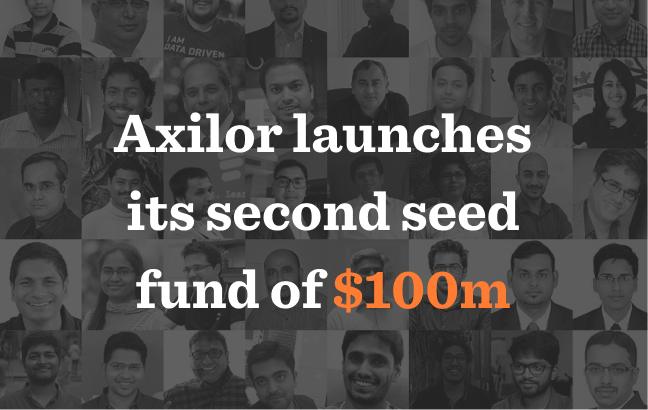If you are reading this article, you’ve likely heard of Axilor before. In a recent survey we ran with founders of leading Indian VCs, many think of us as one of the country’s leading independent accelerators, which given the short 3 year life span of Axilor, is not a bad place to be.
What many of you may not know is that over the last 3 years, quietly on the side, we have been building a seed investment portfolio of some pretty awesome start-ups as well. 17 companies over the last 3 years have received between 75L — 3 Cr of seed funding from us, outside of the accelerator start-ups that we work with. With 3 up-rounds, 2 cash & stock exits, 4 cash flow positive companies and less than 10% mortality rate in this portfolio, we felt like the time was right to double down on this part of our business as well.
Our goal for the seed fund continues to be to work with early stage tech start-ups in the first 2–3 years of their journey. Most of the seed investees in our portfolio are either bootstrapped or have raised only an angel round of money from a funding perspective and have a loyal set of users hooked to a core product offering from a business perspective. The company is typically raising $500k-1m, to scale their user base and also add more features/ products to embed themselves further into their users’ lives.
When we invested in Urbanpiper in December 2016 , they had a handful of clients, one of who was Amuleek Bijral, founder of Chaipoint. When a company is able to satisfy a highly demanding customer like Amuleek, we know that they are doing something right! Today they have grown the customer base 10x and also raised a subsequent round of funding lead by GoFrugal a couple of months ago.
Different kinds of founders have chosen to work with us: Second-time founders with track record of exits; Scientists with Ph.Ds; US returnee-s and founders who set-up their companies almost as soon as they stepped out of college. And they have each got a different set of benefits from us outside of capital.
Whether consciously or as a consequence of market forces, our portfolio now consists of the following kinds of companies and founders:
1) The Market Creators: Who are not afraid to be the first to go out and create new markets
2) The ‘Velcro’ guys : who make a vital process or daily experience seamless for their customers and become very hard to shut down/ replace in the process
3) The ‘Tinkerers’: who are as happy working with real materials by day while writing code by night
Market Creators: These are the companies in our portfolio who are not just replacing someone else by being cheaper (that’s valuable too!) but are taking the first principles approach to building new offerings, certainly for India and in many cases internationally too. Pocketaces was one of the early players to create a non-celebrity led, millennial content platform which replaces TV viewing time with their online videos. In fact, instead of relying on celebrities, their actors have gone on to become mini celebrities themselves! mUrgency has built a unique responder network i) To provide travel assistance at airports ii) for emergency healthcare in places with low ambulance penetration. In both these cases, the team is putting in place and training a pool of responders that users can tap into on demand, that was not available before. Openapp has built a unique connected padlock which is the first of its kind in the world and can be used outdoors without being connected to an electricity source at all times.
A lot has to go right for these companies to succeed. Underlying tailwinds of market forces, patience to wait for the rest of the ecosystem to get into place and in many cases do the heavy lifting themselves. But as Axilor’s own founders keep reminding us, one of the many things they had to do in the first few years at Infosys was practically lay roads to Electronic City where there were none. If our start-up founders are not afraid to do the same, we are willing to back them
The ‘Velcro guys’: These are the founders who typically work in the B2B segment, and sit at the middle of a daily process of our customer, and make a previously broken process seamless. Urbanpiper’s Hub product is the Interchange of the food delivery management for restaurants. They streamline order processing from every possible channel that a consumer can use to make an online order today — whether via Swiggy/ Zomato/ FoodPanda/Uber Eats or the restaurant’s own channels such as website and app, and help them manage order queues, reconcile transactions and payments across all these channels. Companies like these embed themselves into the daily lives of the customers, and switching them off has some pretty large repercussions. We like that.
The Tinkerers: This is one hypothesis we have built over time as too many companies kept coming our way and it became hard to ignore. Contrary to many institutional funds, we have built a sizable portfolio of companies with a hardware component. The key criteria for us was that none of them are consumer focused but selling to businesses. Many VCs in the country have shied away from backing India focused B2B product companies because it’s been so hard to get large Indian enterprises to devote significant budget/$$ to buy products from Indian start-ups. The biggest grouse has been that while enterprises pay for technology, they only do so to the SAPs, Microsofts, Ciscos of the world. Our IoT companies have no such global competition to beat, and are solving unique challenges for their enterprise customers that can only be solved with a mix of hardware and software play. Consequently, our start-ups are billing their Indian customers from lakhs to crores every year. Case in point is Openapp, which is systematically replacing every lock for their customers (ISPs, Warehousing companies etc) or Securax which has replaced ‘dumb’ biometric access control systems with a layer of intelligence on top.
With the fund set-up, we hope to continue doing more of the above — make at least 3–4 new investments every year, funding teams with 2–4 Cr of initial capital to begin with, and continue supporting them for the next couple of rounds. We will continue to try to back companies which have the potential to be category leaders by improving upon an existing offering significantly or making something significantly cheaper.






